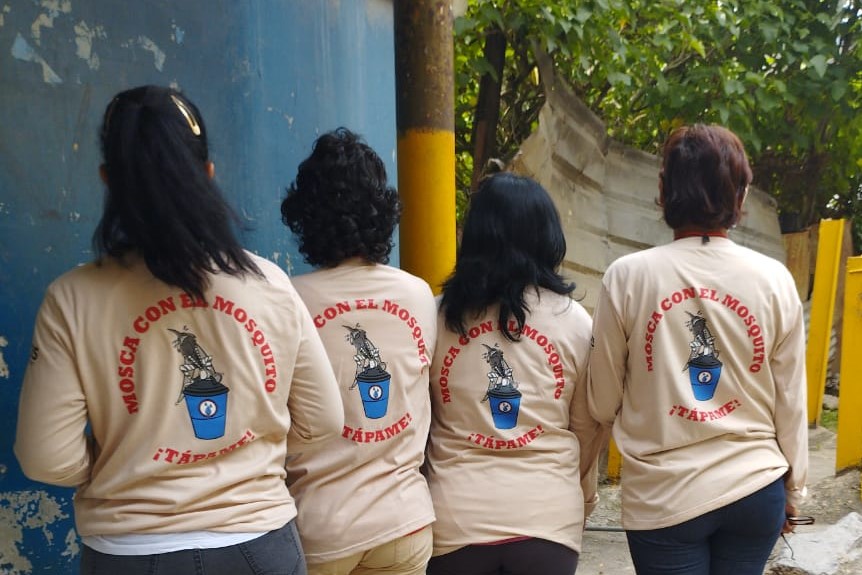The MENTOR Initiative provides life-saving primary healthcare for displaced, vulnerable and hard to reach communities through the training and support of Community Health Workers (CHWs). In the past year we have trained and provided support to over 3,000 community health workers across our programmes in Central African Republic, Mozambique, Angola, Syria and Venezuela.
Community health workers are the critical first point of contact for the people in their community. They are trained and supported to diagnose and treat diseases like malaria and Neglected Tropical Diseases, such as leishmaniasis and schistosomiasis. They also refer serious cases to health facilities further away that can provide more advanced treatment.
The CHWs work in places that have the highest disease burden in the world. A combination of poor living conditions, overcrowding, malnutrition and inadequate shelter and sanitation means that diseases spread quickly and are often fatal.
In these challenging, insecure environments, access to community-level health care, information and treatment is essential to reduce morbidity and mortality.
MENTOR programmes
Central African Republic
Across three regions in Central African Republic (CAR), our community-based healthcare is delivered by 443 community health workers and 110 female focal points.
MENTOR CHWs provide a comprehensive health package enabling diagnosis and treatment of the key diseases that cause the most morbidity and mortality in CAR, such as malaria, diarrhoea and respiratory diseases.
The CHWs also screen for malnutrition and support vaccinations and mass drug administration campaigns against neglected tropical diseases. A key part of the programme allows the CHWs to directly pay for serious cases to be transported from their communities to health facilities or a hospital for treatment.
Occasionally, sudden insecurity can lead to whole communities becoming displaced at short notice. Because CHWs can move with their communities, they are able to provide continuous medical support to those most in need.
In 2021 there was a total of 142,381 consultations with community health workers in 10 districts, of which nearly 90,000 were for children under five.
In CAR, female community leaders known as Female Focal Points, work alongside CHWs to provide maternal and children services in an environment where it is especially difficult to recruit female community health workers. This has increased the number of consultations on women’s health issues and for victims of gender-based violence. They also ensure information about vaccinations, breastfeeding and giving birth is more easily accepted.
Mozambique
Refresher training for 305 community health workers, known locally as Agentes Polivalentes Elementares (APEs), was recently completed in 11 districts in Cabo Delgado Province, Mozambique. Delivered with the provincial Ministry of Health, the training covered hygiene promotion, malaria case management, medical supply chains and registering and reporting cases.
Ongoing support for Agentes Polivalentes Elementares includes monthly visits for on-the-job coaching, enabling communication with referral centres (clinics and hospitals), and distributing forms to collect data.
From July 2021 to March 2022 there was a total of 256,737 outpatient consultations – 111,189 of these were confirmed cases of malaria. 65% of cases were treated by Agentes Polivalentes Elementares and the rest referred to local health centres for further consultation.
Angola
In Angola we support 187 community health workers – known locally as Agentes de Desenvolvimento Comunitário (ADECOS) – in Zaire and Uige provinces and 210 in Cunene and Cuando Cubango provinces.
ADECOS oversee malaria case management at a community level in co-ordination with the local health administration. As with other programmes, they test and treat non severe cases of malaria whilst referring more complicated cases to the nearest health facility.
In southern Angola where malaria transmission is low, the programme is gradually transitioning to an elimination through surveillance approach. ADECOS form part of this strategy by providing more granular and individual level data that can help identify focus of transmission. By diagnosing and treating cases as soon as possible, ADECOS also contribute to the interruption of transmission in these areas already targeting elimination.
Venezuela
In Venezuela, 453 trained community health workers carry out hygiene promotion activities door-to-door to reduce the spread of infectious diseases. Working from a network of regional health facilities, they also distribute lids for water containers and larvicide to prevent vectors such as mosquitos from breeding.
The programme is targeting communities in seven states in Venezuela affected by the economic and political crisis in the country.
Syria
As part of our Syria programme, we worked with local health partners in 2021 to support and train their 1,646 community health workers to diagnose and refer cases of leishmaniasis and other common infectious diseases. These CHWs now work directly with their community providing critical healthcare in this challenging setting.

